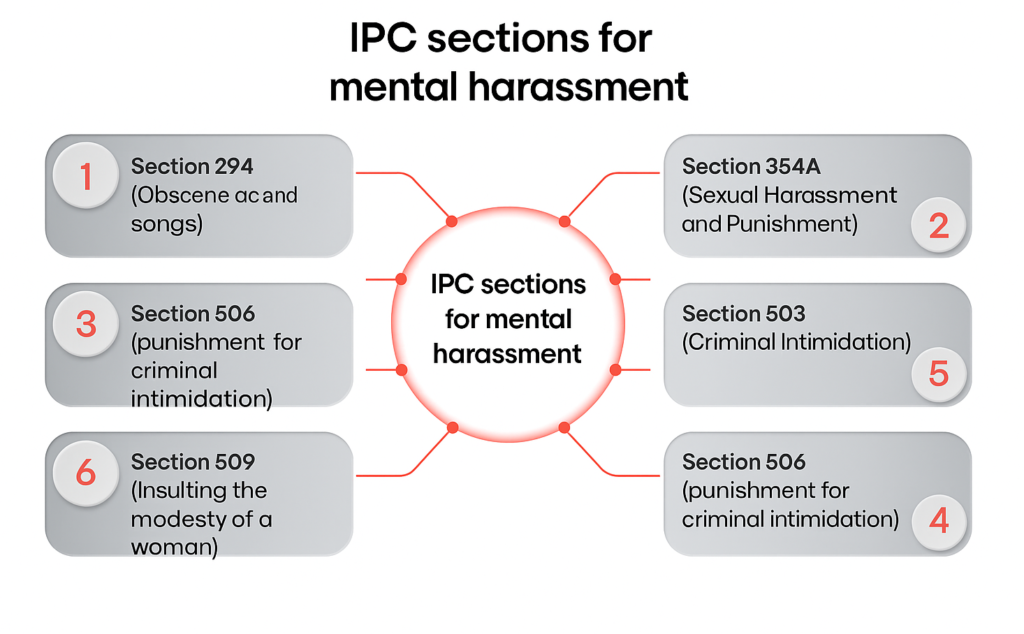Mental Harassment at Workplace: Meaning, IPC Sections, & Laws

Posted Jul 2025
Mental Harassment at workplace is an issue of great concern that impacts the dignity, job performance, and well-being of workers. It may manifest itself in different ways, including verbal harassment, humiliation, discrimination, exclusion, or persistent under pressure, and goes unnoticed.
In India, while physical harassment laws are more clearly defined, mental harassment also falls under specific sections of the Indian Penal Code (IPC) and is addressed through various labor and civil rights legislations. This article will be a detailed discussion of the meaning of Workplace mental harassment, its types, related Indian laws & sections along with how to tackle the harassment cases successfully.
Mental Harassment at Workplace: Definition & Meaning
Workplace Mental Harassment is a consistent behaviour that causes emotional distress, psychological trauma, or mental discomfort to the employee. It involves actions such as constant criticism, bullying, intimidation, manipulation, or unfair treatment by colleagues or supervisors.
It could not necessarily leave physical scars but significantly impacts morale, confidence, and competence to work professionally. It may cause stress, depression, and even physical illnesses. In the Indian legal system, such behaviour is considered a violation of basic human rights and professional ethics.
Types of Mental Harassment at Workplace
Harassment at workplace is not necessarily physical; it tends to be expressed by behavior, tone of voice, and actions that tire an employee emotionally over time. The following are the most common types of metal harassment at workplaces –
| Type of Mental Harassment | Description |
|---|---|
| Verbal Harassment | Shouting, insults, sarcastic remarks meant to humiliate or stress the employee. |
| Sexual Harassment | Unwanted physical contact, comments, gestures, or demands creating a hostile work environment. |
| Discriminatory Harassment | Unfair treatment based on gender, caste, religion, disability, or age. |
| Racial Harassment | Discrimination or offensive behavior based on race, ethnicity, or skin color. |
| Religious Harassment | Mocking or forcing religious beliefs, or unfair treatment based on faith. |
Indian Laws and IPC Sections for Mental Harassment
Workplace Mental Harassment is an abuse of personal dignity and professional ethics. While India does not have a single integrative law exclusively addressing mental harassment, various provisions under the Indian law for mental harassment at workplace includes: Indian Penal Code (IPC), labor legislation, and constitutional rights provide protection.
IPC Sections for Mental Harassment at Workplace

Section 294 (Obscene acts and songs) – Punishes obscene words or deeds in public, which can be used if verbal abuse or mental harassment is openly carried out in the workplace.
Section 354 (Outraging the modesty of a woman) – Guards women against harassment that offends their dignity, particularly if mental harassment includes sexually oriented conduct or comments.
Section 354A (Sexual Harassment and Punishment) – Particularly deals with unwanted physical contact, sexual advances, and other offensive unauthorized behavior, including verbal or non-verbal conduct.
Section 503 (Criminal Intimidation) – Applicable in a situation where an individual threatens another to create alarm or force them to do something against their will, which is prevalent in cases of mental harassment.
Section 506 (punishment for criminal intimidation) – Punishes threatening behavior aimed at mentally disturbing or pressurizing someone.
Section 509 (Insulting the modesty of a woman) – Covers words, acts, or conduct that mentally harass or demean a woman in the workplace.
The Industrial Employment (Standing Orders) Act, 1946
This Act mandates firms to specify employee behavior and disciplinary actions, including mental or verbal harassment-related misconduct.
The Factories Act, 1948 and Shops and Establishment Acts
Though these Acts target working conditions and employee rights, they facilitate the mental welfare of workers by mandating honest treatment and workplace safety.
The Constitution of India – Article 21
Ensures the right to life and personal freedom, including the right to live with dignity. The mental harassment, which impairs dignity or peace of mind, can be filed against under this basic right.
How to Complaint Against Mental Harassment at Workplace
Workers who experience mental harassment at workplace in India may pursue justice through the internal organizational procedures as well as legal channels. The following are the two primary means of complaining:
Online Complaint for Mental Harassment
Employees may file an online complaint on the Ministry of Labour and Employment’s CPGRAMS portal (Centralized Public Grievance Redress and Monitoring System) or through the website of the National Human Rights Commission (NHRC).
- Go to the concerned portal (for example, www.pgportal.gov.in or www. shebox.nic.in).
- Enter personal details, name of organization, and nature of the harassment
- Upload attachments or documents, if any
- Submit the complaint and monitor its status online
Mental Harassment Complaint to Police
If harassment is very serious or comprises threats, defamation, or criminal intimidation, a First Information Report (FIR) should be lodged by the police at the local level under concerned sections of IPC (like Sections 503, 506, 509).
- Go to the local police station and recount the incident
- Bring supporting materials (emails, messages, witness contact details)
- Ask the police to register a FIR under applicable provisions of IPC
- Request a copy of the FIR for record
Note: If the police refuse to register a complaint, the victim may approach the Superintendent of Police. Or you can directly file a complaint with the Magistrate under Section 156 (3) of the Criminal Procedure Code.
Seek Justice with the Best Lawyer in Delhi
Mental Harassment at workplace can deeply affect a person’s emotional health, work productivity, and overall well-being. Victims are usually frustrated, confused, and do not know what to do legally. In such cases, fighting for justice with the help of a professional and trusted lawyer in Delhi makes the progression easy.
To get successful legal action, it is important to seek the advice of lawyers with expertise in labor laws, workplace harassment, and criminal law. Such a well-known legal firm is Chambers of Mohit Singh, led by Advocate Mohit Singh, with an experienced team practicing similar cases.
Mohit Singh specializes in handling workplace harassment victims with sensitivity and accuracy as a criminal lawyer in Delhi.
His lawyers have thorough knowledge of IPC sections concerning mental harassment and constitutional safeguards. Whether it is a complaint to the police, a claim for compensation, or defending a court case, Advocate Mohit Singh offers strategic legal solutions.

